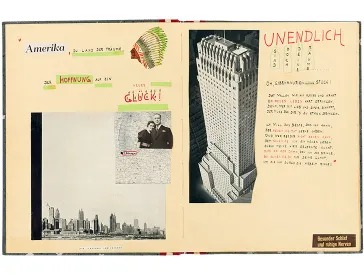Emigration/Exile
“Exile” comes from the Latin word “exilium,” which means “staying in foreign lands.” People are forced to go into exile for different reasons. Nowadays people usually go into exile because they are persecuted, threatened, or in fear of losing their lives for religious, ethnic, cultural, or other reasons.
Roman Vishniac: Wolf (1922–1973) and Luta Vishniac (1899–1998) at the railing of the "S.S. Siboney" shortly before reaching the port of New York on 31 December 1940; Jewish Museum Berlin, accessiib 2004/93/86, gift of Mara Vishniac Kohn
Many people were forced to flee Germany in the era of Nazi rule between 1933 and 1945. Some left for political or other reasons, but most went into exile because they were persecuted as Jews. At that time the professions Jews were allowed to practice in Germany were restricted, and Jewish children and students were increasingly barred from attending schools and universities. Furthermore, the Nazis introduced a growing number of measures to deprive Jews of their possessions and civil rights, limit food supplies, and hamper their freedom of movement. This meant they were denied access to cinemas, swimming pools, social clubs, and many other public places.
When, in November 1938, synagogues and Jewish-owned stores were destroyed and a large number of Jews were insulted, threatened, maltreated, and arbitrarily arrested, the wave of refugees from Germany reached its peak. But the countries offering refuge increasingly tightened entry conditions, making it difficult to leave Germany. Also, many Jews simply could not afford to emigrate, a very expensive undertaking. By the time the final ban on Jewish emigration was issued on 23 October 1941, around 275,000 people had fled Germany – more than half the number of Jews who lived there in 1933.












